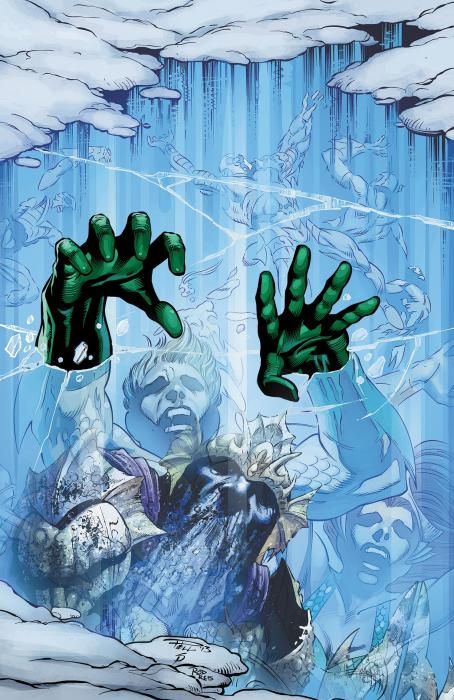In "Aquaman" #22 by Geoff Johns and Paul Pelletier, Aquaman sits unsteadily on his unwanted throne as three different groups aim to knock him off it.
In "Aquaman" #18, Arthur returned to sit on the throne of Atlantis, and Johns indicated three distinct threats to Aquaman's new reign: rebellion from Murk's faction which backs Orm, Scavenger's sneak attack and the First King's reemergence. In "Aquaman" #22, each of these groups simultaneously and independently make progress against Aquaman. As impressive as Johns has made the character, Arthur probably can't handle all this single-handedly, or even with Mera at his side.
"Aquaman" #22 feels like a transition issue of getting dominos in place before the real game begins. Three storylines all converge on a struggle for the throne, but they each compete for attention, diminishing investment in each outcome. Arthur's best bet would be to lay low and let some of his enemies take each other out. The real fun would be seeing Orm's reaction to Scavenger or the First King, or vice versa, and there is little doubt that Johns is building towards some variety of battle-heavy introductions, probably with some comic expressions of dismay from each anti-Arthur group when they become clued in to the existence of the others.
The captions and Pelletier artwork keep the setting shifts clear. Also, Pelletier draws two double-page spreads, one of Atlantis, the other of a ruined ship. While static images are not the cornerstone of comics storytelling, the two images are worth mentioning for their virtuosity of detail and in how they grab the reader's attention, creating much-needed pauses in the action. A change of monarch is historically a shaky time for kingdoms, so it's not unreasonable that there would be this much going on at once. It's just that it leaves little room for anything else.
In Johns' "Aquaman," the strongest scenes have been the humorous sequences in which Aquaman and Mera grapple with being on land, and their feelings of alienation and adjustment, common to expatriates and immigrants. Those scenes were personal, funny and poignant, and they displayed Johns' excellent ear for casual dialogue. In "Aquaman" #22, there is a scene in which Warden Urn and another guard argue about Vulko, and the dialogue shows the Atlantean regard for the rule of law, without Johns coming out and saying it. However, the dialogue for the other scenes feels more rote.
In characterization, Tula and Murk's loyalty to Orm is the most sympathetic anti-Arthur motivation, while the First King's claims promise a philosophical struggle over a sovereign's right to a throne. Given Xebel's reaction, Johns creates suspense around the eventual reaction of Atlanteans. Scavenger unfortunately gets almost no character development, and his motivations remain least sensible, given how he and his men can't even breathe underwater without equipment.
The twist near the end regarding Nereus's reaction was predictable, but Johns was imaginative in having the First King tell his story to the inhabitants of Xebel through his ice. Also, the First King judges Arthur poorly for his decisions or duties regarding Xebel and the Trench. Could it be true that Arthur is guilty of unthinking xenophobia or neglect? It's a historian's approach to Atlantis, and it's a daring move by Johns to have another character, even a villain, cast Arthur's actions in this way.
"Aquaman" #22 merely moves things along, but Johns' setup and Pelletier's art promise that the eventual conclusion and fallout from "Death of a King" could be significant for Atlantis and its government by hereditary monarchy.

